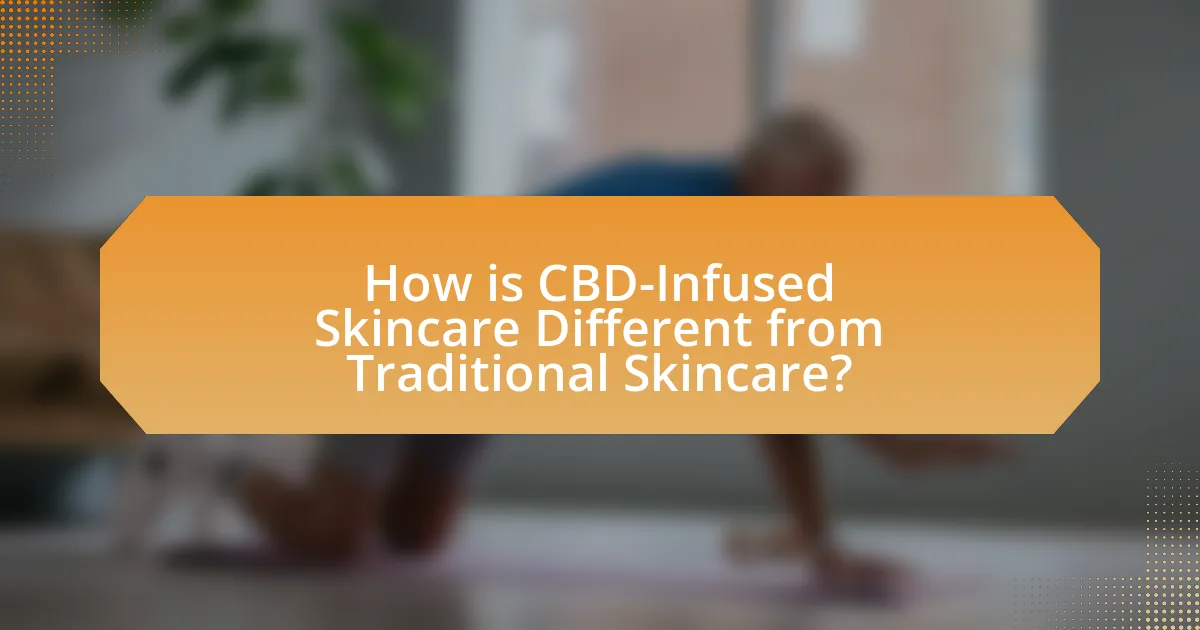CBD-infused skincare is gaining attention for its numerous benefits related to daily wellness, including anti-inflammatory properties, enhanced hydration, and improved skin barrier function. Research highlights that CBD can effectively reduce inflammation and redness, making it advantageous for conditions such as acne and eczema. Additionally, CBD’s antioxidant effects protect the skin from oxidative stress, while its ability to regulate sebum production aids in managing acne. The article explores the unique properties of CBD, its interaction with the skin’s endocannabinoid system, and the distinctions between CBD-infused and traditional skincare products, providing insights into the growing popularity and effectiveness of CBD in skincare routines.

What are the Benefits of CBD-Infused Skincare for Daily Wellness?
CBD-infused skincare offers several benefits for daily wellness, including anti-inflammatory properties, hydration, and skin barrier support. Research indicates that CBD can reduce inflammation and redness, making it beneficial for conditions like acne and eczema. Additionally, CBD is known to enhance moisture retention in the skin, which helps maintain hydration levels. Furthermore, studies suggest that CBD may strengthen the skin’s natural barrier, improving overall skin health and resilience. These properties collectively contribute to a more balanced and healthier complexion, supporting daily wellness.
How does CBD contribute to skin health?
CBD contributes to skin health primarily through its anti-inflammatory and antioxidant properties. Research indicates that CBD can reduce inflammation, which is beneficial for conditions like acne and eczema, as it helps to calm the skin and prevent breakouts. Additionally, CBD’s antioxidant effects protect the skin from oxidative stress caused by free radicals, which can lead to premature aging. A study published in the Journal of Clinical Investigation found that CBD can inhibit the production of sebum, the oily substance that can clog pores and lead to acne. This evidence supports the assertion that CBD is effective in promoting overall skin health.
What are the key properties of CBD that benefit the skin?
CBD possesses anti-inflammatory, antioxidant, and moisturizing properties that benefit the skin. These properties help reduce redness, soothe irritation, and protect against environmental stressors. Research indicates that CBD can inhibit the production of sebum, which may aid in managing acne. Additionally, its antioxidant effects can combat free radicals, potentially slowing down the signs of aging. A study published in the Journal of Clinical Investigation found that CBD’s anti-inflammatory effects can significantly reduce the severity of skin conditions like eczema and psoriasis.
How does CBD interact with the skin’s endocannabinoid system?
CBD interacts with the skin’s endocannabinoid system by binding to cannabinoid receptors, primarily CB1 and CB2, which are present in skin cells. This interaction helps regulate various skin functions, including inflammation, pain sensation, and sebaceous gland activity. Research indicates that CBD can reduce inflammation and promote skin barrier function, contributing to improved skin health. A study published in the Journal of Dermatological Science found that CBD can inhibit the production of sebum, which is beneficial for acne-prone skin, demonstrating its potential therapeutic effects on skin conditions.
What specific wellness benefits can CBD-infused skincare provide?
CBD-infused skincare provides specific wellness benefits such as anti-inflammatory properties, hydration, and skin barrier protection. Research indicates that CBD can reduce inflammation and redness, making it beneficial for conditions like acne and eczema. Additionally, CBD has moisturizing effects that help maintain skin hydration, which is crucial for overall skin health. Studies have shown that CBD can enhance the skin’s barrier function, protecting against environmental stressors and improving overall skin resilience.
How can CBD help with inflammation and redness in the skin?
CBD can help reduce inflammation and redness in the skin by interacting with the body’s endocannabinoid system, which plays a crucial role in regulating skin health. Research indicates that CBD possesses anti-inflammatory properties, which can alleviate conditions such as acne, eczema, and psoriasis, leading to a reduction in redness and irritation. A study published in the Journal of Clinical Investigation found that CBD can inhibit the production of sebum and has anti-inflammatory effects on human sebocytes, supporting its efficacy in treating inflammatory skin conditions.
What role does CBD play in hydration and moisture retention?
CBD plays a significant role in hydration and moisture retention by interacting with the skin’s endocannabinoid system, which helps regulate various skin functions, including hydration. Research indicates that CBD can enhance the skin’s barrier function, reducing transepidermal water loss and promoting moisture retention. A study published in the Journal of Clinical Investigation found that cannabinoids, including CBD, can modulate the production of sebum and improve skin hydration levels, thereby contributing to overall skin health.

How is CBD-Infused Skincare Different from Traditional Skincare?
CBD-infused skincare differs from traditional skincare primarily in its incorporation of cannabidiol, a compound derived from the cannabis plant known for its anti-inflammatory and antioxidant properties. Traditional skincare products typically focus on moisturizing and cleansing without the therapeutic benefits associated with CBD. Research indicates that CBD can help reduce acne, soothe irritated skin, and provide relief from conditions like eczema and psoriasis due to its ability to interact with the body’s endocannabinoid system, which regulates skin health. This unique interaction sets CBD-infused products apart, offering potential benefits that traditional skincare formulations may not provide.
What unique ingredients are found in CBD-infused products?
CBD-infused products typically contain unique ingredients such as cannabidiol (CBD) derived from hemp, terpenes, and various carrier oils like coconut or hemp seed oil. Cannabidiol is the primary active compound known for its potential therapeutic benefits, including anti-inflammatory and antioxidant properties. Terpenes, which are aromatic compounds found in cannabis, can enhance the effects of CBD and contribute to the overall sensory experience. Carrier oils are essential for delivering CBD effectively through the skin, ensuring better absorption and efficacy. These ingredients collectively contribute to the unique formulation of CBD-infused products, aimed at promoting skin health and overall wellness.
How do these ingredients enhance the effectiveness of skincare?
CBD-infused ingredients enhance the effectiveness of skincare by providing anti-inflammatory, antioxidant, and moisturizing properties. These properties help to soothe irritated skin, reduce redness, and protect against environmental stressors. Research indicates that CBD can modulate the skin’s endocannabinoid system, which plays a crucial role in maintaining skin health and homeostasis. A study published in the Journal of Clinical Investigation found that CBD can inhibit excessive sebum production, thereby reducing acne and promoting clearer skin. Additionally, CBD’s ability to hydrate and nourish the skin contributes to improved elasticity and overall appearance, making it a valuable component in skincare formulations.
What are the differences in formulation between CBD and non-CBD products?
CBD products contain cannabidiol as a key ingredient, while non-CBD products do not. The formulation of CBD products typically includes hemp-derived extracts, which may also contain other cannabinoids, terpenes, and fatty acids that contribute to the entourage effect, enhancing the therapeutic benefits. In contrast, non-CBD products often rely on synthetic or natural ingredients without the inclusion of cannabinoids, focusing instead on traditional skincare components like moisturizers, vitamins, and essential oils. Research indicates that CBD can provide anti-inflammatory and antioxidant properties, which are not present in non-CBD formulations, making CBD products potentially more beneficial for skin health.
Why is CBD becoming a popular choice in skincare routines?
CBD is becoming a popular choice in skincare routines due to its anti-inflammatory properties and ability to soothe various skin conditions. Research indicates that CBD can help reduce acne, eczema, and psoriasis by regulating oil production and acting as an anti-inflammatory agent. A study published in the Journal of Clinical Investigation found that CBD significantly reduced sebum production in human sebocytes, which supports its effectiveness in managing acne. Additionally, CBD’s antioxidant properties help protect the skin from environmental stressors, further enhancing its appeal in skincare formulations.
What trends are driving the demand for CBD-infused skincare?
The demand for CBD-infused skincare is driven by increasing consumer awareness of natural ingredients and the growing trend towards holistic wellness. Consumers are increasingly seeking products that offer therapeutic benefits, and CBD is recognized for its anti-inflammatory and antioxidant properties, which can improve skin health. According to a report by Grand View Research, the global CBD skincare market is expected to reach $1.7 billion by 2025, reflecting a compound annual growth rate of 33.5%. This growth is fueled by the rising popularity of CBD in beauty and wellness sectors, as well as the legalization of hemp-derived CBD in various regions, making it more accessible to consumers.
How do consumer perceptions of CBD influence its popularity?
Consumer perceptions of CBD significantly influence its popularity by shaping attitudes towards its efficacy and safety. Positive perceptions, often driven by anecdotal evidence and increasing media coverage, lead to higher consumer interest and demand for CBD products. For instance, a survey by the Brightfield Group found that 60% of CBD users reported using it for wellness benefits, indicating a strong belief in its positive effects. Additionally, as consumers become more educated about CBD through social media and online platforms, their willingness to try CBD-infused skincare products increases, further boosting its market presence.

What Should You Consider When Choosing CBD-Infused Skincare Products?
When choosing CBD-infused skincare products, consider the product’s CBD concentration, source of the CBD, and additional ingredients. The CBD concentration affects the product’s effectiveness; higher concentrations may provide more noticeable benefits. The source of the CBD is crucial, as products derived from organic hemp are generally more reliable and free from harmful chemicals. Additionally, examine the formulation for other beneficial ingredients, such as antioxidants or natural oils, which can enhance the overall skincare benefits. Research indicates that products with a full-spectrum CBD extract may offer enhanced effects due to the entourage effect, where various compounds work synergistically.
How can you identify high-quality CBD skincare products?
To identify high-quality CBD skincare products, examine the product’s ingredient list, sourcing, and third-party lab testing. High-quality products typically contain full-spectrum or broad-spectrum CBD derived from organically grown hemp, ensuring minimal exposure to pesticides and heavy metals. Additionally, reputable brands provide access to Certificates of Analysis (COAs) from independent labs, confirming the product’s cannabinoid content and purity. For instance, a study published in the Journal of the American Medical Association found that many CBD products do not contain the amount of CBD claimed on the label, highlighting the importance of third-party testing for quality assurance.
What certifications or lab tests should you look for?
Look for certifications such as USDA Organic, GMP (Good Manufacturing Practices), and ISO certifications, as well as lab tests that confirm cannabinoid content, purity, and the absence of contaminants like heavy metals and pesticides. These certifications ensure that the CBD-infused skincare products meet high-quality standards and are safe for use. For instance, products tested by third-party laboratories provide transparency regarding their cannabinoid profiles and safety, which is crucial for consumer trust and product efficacy.
How do ingredient lists impact the effectiveness of CBD products?
Ingredient lists significantly impact the effectiveness of CBD products by determining the quality, bioavailability, and synergistic effects of the ingredients. High-quality carrier oils, for instance, enhance the absorption of CBD into the skin, while additional beneficial ingredients like antioxidants or essential oils can amplify the overall therapeutic effects. Research indicates that formulations containing complementary ingredients can lead to an “entourage effect,” where the combined action of multiple compounds enhances the efficacy of CBD. For example, a study published in the Journal of Clinical Investigation found that certain terpenes and flavonoids present in cannabis can work synergistically with CBD to improve its anti-inflammatory properties. Thus, a well-curated ingredient list is crucial for maximizing the potential benefits of CBD-infused skincare products.
What are the best practices for incorporating CBD skincare into your routine?
To effectively incorporate CBD skincare into your routine, start by selecting high-quality products that contain a verified concentration of CBD, as this ensures efficacy. Gradually introduce CBD skincare by patch testing on a small area to assess skin sensitivity and reactions. Follow a consistent application schedule, ideally using CBD-infused products both morning and night, to maximize benefits such as hydration and anti-inflammatory effects. Additionally, combine CBD skincare with other complementary products, like moisturizers and sunscreens, to enhance overall skin health. Research indicates that CBD can reduce inflammation and improve skin conditions, making it a valuable addition to daily skincare routines.
How often should you use CBD-infused products for optimal results?
For optimal results, CBD-infused products should be used daily. Consistent daily application allows the skin to absorb the beneficial compounds effectively, leading to improved hydration, reduced inflammation, and enhanced overall skin health. Research indicates that regular use can maximize the therapeutic effects of CBD, as seen in a study published in the Journal of the American Academy of Dermatology, which found that daily application of CBD can significantly improve skin conditions like acne and eczema.
What tips can enhance the benefits of CBD in your skincare regimen?
To enhance the benefits of CBD in your skincare regimen, incorporate products with a high concentration of CBD, as studies indicate that higher concentrations can lead to more significant anti-inflammatory and antioxidant effects. Additionally, using CBD-infused products consistently, such as serums or creams, can improve skin hydration and reduce redness over time, as evidenced by research showing CBD’s efficacy in managing skin conditions like eczema and acne. Combining CBD with other beneficial ingredients, such as hyaluronic acid or vitamins C and E, can further amplify its effects, as these compounds work synergistically to promote skin health and resilience.
What are common misconceptions about CBD-infused skincare?
Common misconceptions about CBD-infused skincare include the belief that it causes psychoactive effects, that it is only effective for certain skin conditions, and that all CBD products are the same. CBD, or cannabidiol, is non-psychoactive, meaning it does not produce a “high” like THC does. Research indicates that CBD can benefit various skin issues, including acne and eczema, but its effectiveness can vary based on formulation and concentration. Additionally, not all CBD products are created equal; factors such as extraction methods and the presence of other beneficial compounds can significantly influence their efficacy.
How does the legality of CBD affect its use in skincare products?
The legality of CBD significantly impacts its use in skincare products by determining whether manufacturers can legally include CBD in their formulations. In regions where CBD is legal, such as the United States under the 2018 Farm Bill, skincare brands can incorporate CBD derived from hemp, which contains less than 0.3% THC, into their products without legal repercussions. Conversely, in areas where CBD remains illegal, such as certain states or countries, the inclusion of CBD in skincare products is prohibited, limiting consumer access and market growth. This legal framework influences product availability, consumer trust, and the overall perception of CBD-infused skincare, as brands must navigate compliance with local regulations to ensure their products are marketable and safe for consumers.
What myths exist regarding the effectiveness of CBD in skincare?
Myths regarding the effectiveness of CBD in skincare include the belief that CBD can completely cure skin conditions, that it is universally effective for all skin types, and that it provides immediate results. Research indicates that while CBD has anti-inflammatory and antioxidant properties, it does not serve as a cure-all for skin issues. A study published in the Journal of the American Academy of Dermatology highlights that CBD may help with conditions like acne and eczema, but results can vary based on individual skin types and conditions. Additionally, the effects of CBD in skincare products may take time to manifest, contradicting the myth of instant results.



